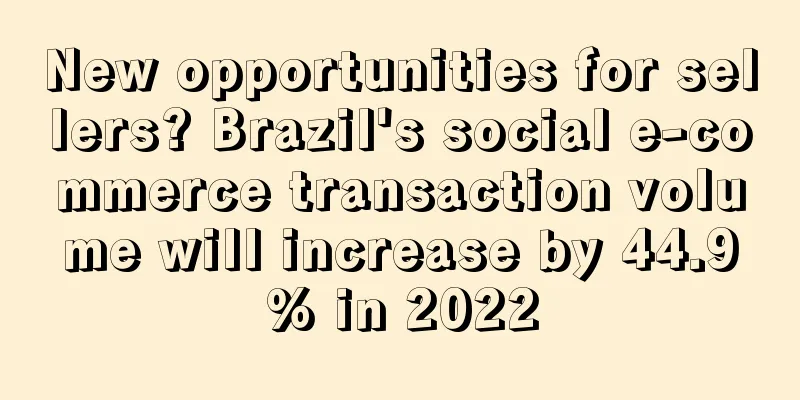New opportunities for sellers? Brazil's social e-commerce transaction volume will increase by 44.9% in 2022

|
As social media platforms such as Tik Tok, Facebook, and YouTube become increasingly popular, brands and merchants have seized on this hot trend and started selling products on social media platforms. Social e-commerce has begun to become one of the e-commerce channels.
Social commerce is currently popular among consumers around the world, including in Latin American countries such as Brazil. Therefore, studies have shown that in the next one to two years , the growth rate of purchasing products through social media platforms such as Tik Tok and Instagram will exceed other traditional e-commerce channels .
According to the survey , in the past year , due to the increasing penetration of the Internet and smartphones among consumers , more than 50% of Brazilian consumers have made online purchases through social media platforms . In addition, the shift from physical store consumption to online consumption has also led to an increase in the penetration rate of social media buyers in Brazil. Industry insiders believe that Brazil's social media platform shopper penetration rate is the highest in Latin America , at 40% .
According to research and analysis, Brazil's social e-commerce GMV ( total transaction volume ) is expected to grow by 44.9% in 2022 to reach US$2.2186 billion . At the same time, Brazil's social e-commerce will grow steadily in the next few years , with a GMV compound annual growth rate of 39.7% between 2022 and 2028 , reaching US$15.9017 billion by 2028 .
For Brazilian social e-commerce shoppers, compared with pricing and discounts, they hope that social media platforms can recommend more cost-effective products of the same type based on their browsing history, and that the platform can use videos and pictures to more intuitively show the functions of products. In addition , Brazilian consumers hope that social media platforms can reasonably set up the user interface to make shopping more convenient.
Influencers ( influential people such as internet celebrities and celebrities ) are another factor driving the rise of social e-commerce in Brazil . It is reported that in August 2021, more than 60% of Brazilian consumers participated in social commerce , and nearly 26.5% of consumers made purchases through influencer live broadcasts . The credibility of influencers in Brazil has reached more than 75%, and the study believes that influencers will continue to drive the development of social e-commerce in the next one to two years .
It is understood that Kuaishou has launched a live shopping service in Brazil, which is still under testing. Driven by this service , the average monthly active users of Kuaishou in Brazil are increasing rapidly .
As one of the countries with the most active e-commerce development in Latin America, Brazil's social e-commerce is in its infancy. Sellers can continue to track the development of this market and consider whether to seize this market opportunity . Brazil Social e-commerce |
<<: Surprise! Amazon Japan will lift this restriction starting May 16
>>: It’s hard to get commission! Amazon operation: I only got commission for two months a year
Recommend
What is Adyen? Adyen Review, Features
Adyen is a global payment company whose mission i...
400 yuan per order! Intermediaries are recruiting part-time workers to register Amazon stores
For most sellers who sell goods in bulk, the numb...
What is flywheel? flywheel Review, Features
Flywheel Data was founded as a value-added reselle...
Australia delivered a record 21 million parcels in November, with fashion accounting for the largest proportion!
Australia Post said November 2021 was "the b...
Enterprise Ghana and Mastercard join forces with companies to support women and young entrepreneurs
The Ghana Enterprise Authority (GEA) and the Mast...
Fake reviews continue to plague Amazon products, with “review merger”
Foreign countries have always strictly regulated ...
What is CGS EXPRESS? CGS EXPRESS Review, Features
Super Light Speed International Logistics (Shenz...
The first cross-border "buy now, pay later" product in the Middle East will be launched, and Amazon's business sales will reach US$25 billion
Amazon Business Sales to Reach $25 Billion a Year...
Alibaba's financial report released: International site becomes a highlight, GMV increased 25 times in the past 7 years
On February 20 , Alibaba released its latest quar...
Home Depot, Lowe's post strong fourth quarter as housing category continues to grow
Consumers have been confined to their homes for t...
What is Socialbakers? Socialbakers Review, Features
Socialbakers is a website that provides data analy...
What is John Lewis? John Lewis Review, Features
John Lewis is the largest department store in Lond...
GMV soared 47 times! Bday's performance in Vietnam has improved, and four major categories have become popular
Lazada's Bday promotion brought new business ...
What is N11? N11 Review, Features
N11 was founded in 2012. It is a new Turkish e-co...
What is Rede SA? Rede SA Review, Features
Rede SA , known as Redecard, is a Brazilian multi...









